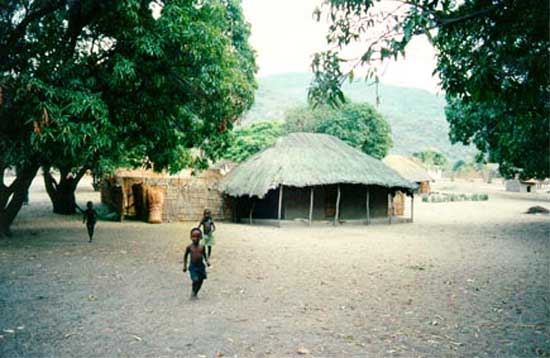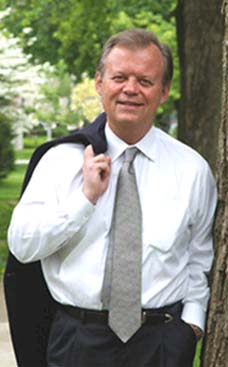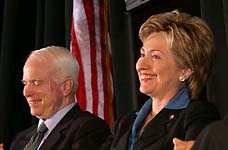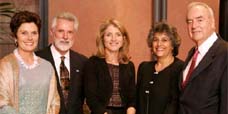
"Life is so poor, but they are always happy and would always welcome you with open arms into their homes," said Gretchen Garman, a 26-year-old Neenah woman who spent 2½ years serving in Malawi through the Peace Corps. "I could never get over the fact that every time I went to someone's home they would always give me a gift: nothing big bananas, eggs, which are difficult to get things I could pay for in a store. But they would be offended if you didn't accept them."
Gretchen Garman's perspective changes after her work in the poor country of Malawi
Peace Corps work shows heart of Africa
A Neenah volunteer's perspective changes after her stint in the poor country of Malawi
By Cheryl Sherry
Post-Crescent staff writer
Malawi has been called the warm heart of Africa.
"Life is so poor, but they are always happy and would always welcome you with open arms into their homes," said Gretchen Garman, a 26-year-old Neenah woman who spent 2½ years serving in Malawi through the Peace Corps. "I could never get over the fact that every time I went to someone's home they would always give me a gift: nothing big bananas, eggs, which are difficult to get things I could pay for in a store. But they would be offended if you didn't accept them."
Serving in Malawi warmed Garman's heart as well.
Since her time in Malawi, Garman has learned to be more patient and less materialistic and value and cherish what she has.
"In the big scheme of things materialistic things don't matter," she said. "I saw tons of people who can't feed their kids or get basic medical care or who are dying of AIDS."
With a population of 11 million, Malawi is nestled between Zambia, Tanzania and Mozambique. It is the fourth-poorest country in the world and has one of the highest HIV/AIDS infection rates in the world with one-tenth of its population infected.
The country is divided into northern, central and southern regions. Through the Peace Corps, Garman lived and worked in the northern region of the country, working as an environmental educator and natural resources extension officer in Nyika Plateau National Park. She lived in the town of Nchenachena.
After receiving a bachelor's degree in recreation management from the University of Wisconsin-La Crosse, Garman did a mandatory internship with Outward Bound in Florida and began considering the Peace Corps.
"I had always thought about the Peace Corps," she said. "I did a lot of volunteering things and kind of grew up in that kind of house."
Although Garman wasn't completely set on the idea, she began the arduous application process, which took about a year. Applying and getting accepted into the corps is completely dependent upon the circumstances.
"It's very difficult sometimes to match up the knowledge skills and abilities of the potential volunteer with the needs of the host countries," explained Gary Lore, public affairs specialist with the Minneapolis regional office of the Peace Corps. "And it takes a certain amount of time to go through the process of becoming qualified. You have to go through a physical examination, eye exam, have your dental check-up and you do have to undergo a background check, and that process by itself is somewhat slow."
Garman left for Malawi in March 2003. She is not the only Neenah native to call Malawi home for 2½ years. Ole Nelson, who graduated from Neenah High School in 1997, joined the Peace Corps in October 2001.
"Wisconsin is a very important contributor to the Peace Corps volunteers," Lore said. "For over a decade, the University of Wisconsin-Madison has been the No. 1 contributor of Peace Corps volunteers. In the whole scheme of things, in the last 45 years, (Madison) is No. 2 and rapidly catching up with No. 1, which is the University of Southern California."
The Peace Corps has been serving in the sub-Saharan nations as needed for more than 40 years.
For the first few months of Garman's stay in Malawi, she lived with a host family who spoke the country's native language of Chicewa. Garman, however, was learning the Bantu language of Chitimbuka, the traditional dialect in the northern portion of the country where she later was assigned.
Volunteers are working in the areas of education, youth outreach and community development, health and HIV/AIDS, agriculture and environment, business development, and informational technology. Garman served as an environmental volunteer.
In many developing countries, environmental problems are magnified because of the communities' dependence on the environment for drinking water, fuel wood or land for farming.
Malawi is one of the most densely populated counties in southern Africa, with 90 percent of the population both urban and rural depending on forests for food, fuel and building materials.
Deforestation is considered the biggest environmental problem facing Malawi. One of the causes of deforestation in Malawi is the production of tobacco leafs for export, which is responsible for 80 percent of import profits for the small country.
Once settled in Nchenachena, one of Garman's primary jobs was establishing women's groups.
"Women are very subordinate to men," she said of the society. "It is a man-based society. We worked on income-generating activities. We did mud stove making to help reduce firewood consumption (because) the forests are depleting. We practiced nutritional baking. Their main food is maize, which they pound into flour, which takes out all the nutritional value. We did a beekeeping workshop. Beekeeping is a big income-generating activity there."
Forming the women's groups empowers the women and gives them a sense of community, Garman said.
"We talked about HIV/AIDS," she said. "No one ever says they die of AIDS. They whisper it. The fact that they won't say it means they haven't come to terms with it. If you can't say it, you can't try to stop it."
Garman also worked with wildlife clubs in the primary and secondary schools, teaching them about conservation and the environment. While the secondary students are taught and speak English in school, the primary students do not.
"So you fumble through it with a lot of hand gestures and smiles," Garman said. "They would point and stare at me because you were the white girl in town."
They called her mzungu, which translates to white person or rich person.
"It gets frustrating,' Garman said. "I try to teach people my name is not mzungu and I won't respond if you call me white person. I have a name."
She also experienced what she called reverse discrimination.
"I was treated better because I was white. I always got the front seat in the car. I always got my bag carried for me. I didn't like it because I am not like that. I'd come to a meeting and they'd give me a chair and everyone else was on the ground. You kind of feel like you're this queen, and I didn't like it. You're trying to integrate into the community and as much as you try you are never invisible."
While in Malawi, Garman got to know another Peace Corps volunteer named Kate Clayton from Minneapolis who was teaching at a local secondary school. They lived about two miles from each other.
Clayton had been in Malawi a year and a half, renting a house on the property of the health clinic, which was owned by Dr. Trywell Nyirongo.
Nyirongo also lives in the village of Nchenachena and manages a group of clinics in an area of rural Malawi known as "the dead North" because of its lack of economic development and infrastructure.
Nyirongo had done part of his schooling in northern Minneapolis and was hooked up with a home stay family, which was part of the same Unitarian Universalist church Clayton's family belonged to. But that wasn't the only coincidence,
"As we were starting to get to know each other, (Clayton) said the other thing is that they have a son who goes to Lawrence University. It seemed like such a small world."
Nyirongo's son is Thomas, and Garman's family has gotten to know Thomas through Lawrence University's Friendship Family Program.
Garman returned to Neenah in July and has applied for graduate school in Arizona, looking to get her master's degree in public health and hoping to eventually work for a nonprofit organization that teaches people how to help themselves.
"When you sit down and talk to a returned Peace Corps volunteer you will find and almost immediately sense these are people who have a different outlook on life," Lore said. "They are positive, they are straightforward and they understand hard work and sweat. And they understand problems of other people. But they don't exercise colonial power; they are exercising brotherhood, friendship."
Cheryl Sherry can be reached at 920-993-1000, ext. 249, or by e-mail at csherry@postcrescent.com.















